An Open Letter from Spring Cheng, Author of The Resonance Code
Dear Adult Development Colleagues,
I am Spring Cheng, author of The Resonance Code: Empowering Leaders to Evolve Toward Wholeness. I am writing to bring to your attention an east-west perspective on a subject dear to our hearts: adult development (or vertical development).
As a Chinese person, born into the traumatic imprints of colonization, I am among the very, very few lucky ones who managed to preserve a memory of my culture’s indigenous roots. Fortunately, I was also privileged to develop my intellect sufficiently to translate my indigenous knowledge into reasonable English. This journey of extending myself through the past then venturing far into the western mind has been arduous beyond measure. At times it almost cost me my life and sanity. However, against all odds, I am here. I feel summoned by a force greater than myself to convey this message.
Through this paper, I share with you an aspect of psyche that, in my view, is crucial to developing wholeness in our journey of individual and collective evolutionary growth. This particular aspect of psyche is missing or misunderstood in the western adult development models. I call this aspect the Earth Mother, the very ground of our being.
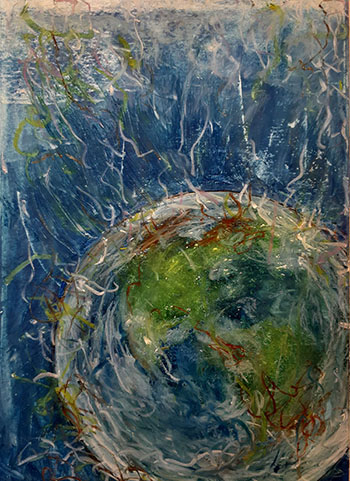
Earth Mother: The Hidden Nature of the Earliest Developmental Stage
Earth Mother, when respected and cared for, allows us to have an embodied, felt-sense of belonging with the living world around us. Earth Mother is embedded within our primordial instincts. It is built into our neurological pathways and interwoven with our biological self. It is our inherent being, rich with ancestral history (human and pre-human), passing down through genetics and epigenetics. It is the soil from which the structure of ego and vertical development grows. It can be accessed at any given point on the vertical developmental scale.
In my view, this ancient Earth Mother instinct, crucial to the rebirth of our civilization, lies at the foundation of vertical development, before the being itself begins what we recognize as a developmental stage. Just as how important a rich, healthy bed of soil is to an organic farmer, a holistic developmental journey requires an intentional tending and caring for the Earth Mother instinct, lying at the very bottom of the vertical development scale.
In the past, when I shared this idea with my colleagues, I encountered a range of responses, from shock and rejection to intrigue and enthusiasm. Most adult development models describe the early developmental stages as separated, fearful, selfish and devoid of a sense of belonging, a stark contrast to anything resembling the qualities of Mother.
Through this article, I invite you to consider how different cultures may have different relationships with the pre-cognitive aspect of the human psyche. Those understandings result in interpretations and the meanings associated with the early developmental stages different from what the current models describe. Seeking to incorporate different views of pre-cognitive development may broaden and diversify our understanding of all developmental stages on the vertical scale of development.

With differences in culture and experience, I anticipate us having different ways of perceiving the world and self. I don’t expect that you would see what I see immediately. I don’t expect I can cross the gap between ancient eastern mind and 21st century western mind in a short essay. I only request that you open your heart to the feelings my message may evoke for you. Feelings, whether good or bad, joy or grief, bliss or anger, reunite us with our Earth Mother as we carry her within.
An Indigenous View of Adult Development
Through the eyes of my indigenous self, I see how my early developmental stages, when welcomed and honored by the rest of myself, provided a rich ground of beingness, an inexhaustible resource incorporating an intelligence far beyond the grasp of my intellect. For me, the true nature of that earliest developmental stage is the Earth Mother. She offers us bountiful blessings when we dive into this earlier stage and allow the “wild and young” part of us to blossom, or even take the lead!
The deeper I allow myself to dive into this stage, the more clearly I see it operating in other people, especially those marginalized, devalued or othered by our mainstream society. Even in those who are deserted by the elite and struggling with violent rage, I can hear the anguished cries of the deranged mothers who have been banished and shunned in their lineage. I see that Earth Mother lives in everyone, with or without that person’s conscious awareness.
However, when I read the descriptions associated with the early developmental stage, I am often shocked by the brutally simplistic, and sometimes, blatantly denigrating descriptions. Where is the beauty, nourishment and belonging to the Earth Mother with which everyone is born? Where is the respect for those indigenous people who have endured the test of time to preserve this aspect of humanity? The words associated with the early stages, “authoritarian, impulsive, opportunist, selfish”, describe a pathology, symptoms of the instinctual nature we deserted as barren land. These characteristics do not define the true nature of this part of ourselves.
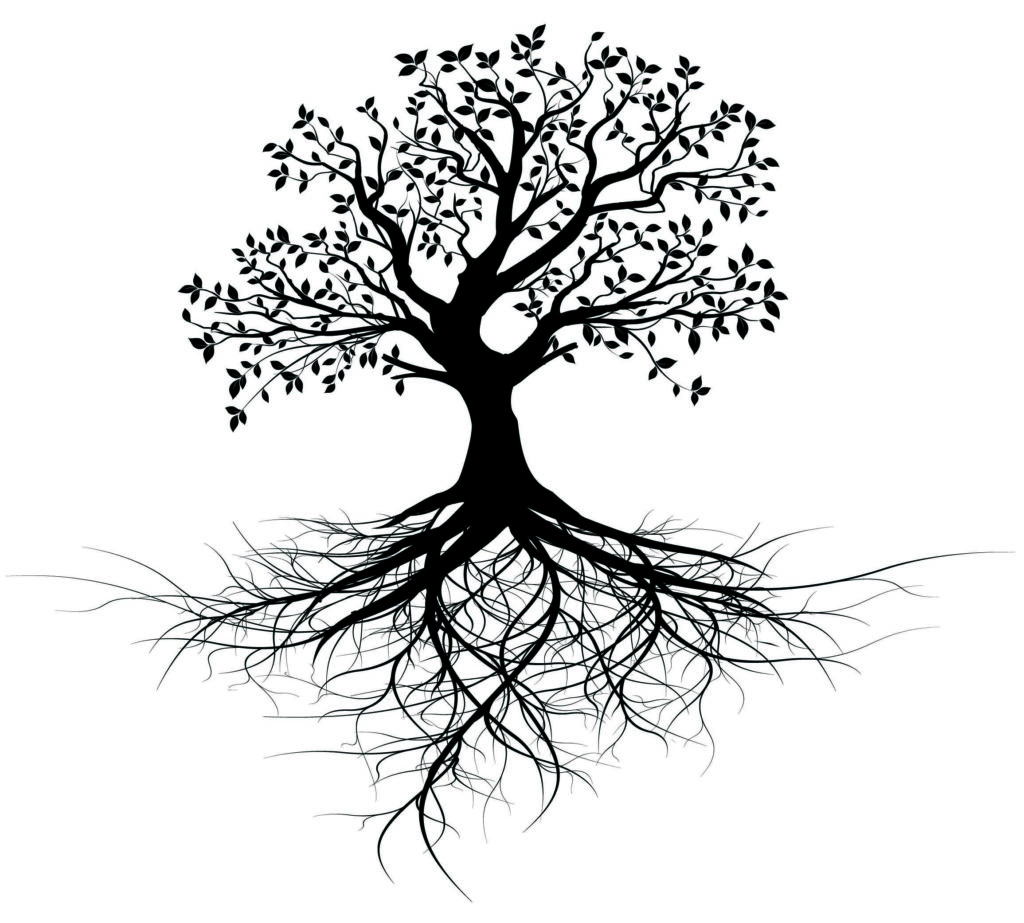
A tree is connected to the forest through both its roots and canopy. When we fix our vision to the trunks, we only see separate, individual trees. Are we blind to the inter-connected nature at the root of our being? How can we regain the vision to “see under the ground”? If we mistake the symptoms of compromised early developmental stages as their true nature, aren’t we continuously weakening our very ground of being? Aren’t we cutting ourselves off from the primordial life force and all its intelligence?
In my experience, the more I embrace and respect the wisdom of my earliest developmental stages, the more my being instinctively “feels” my inherent belonging to the living beings around me, and to the living systems larger than the human world. This felt-sense of belonging nourishes and fulfills me. I do not have a compulsive urge to develop into higher stages, except when I choose, at the right time and in the appropriate context. When supplied with that instinctual sense of belonging, I have more will power, more courage, and more momentum to express my potential than my wildest dreams can imagine.
In my view, the narratives associated with early developmental stages do not really reflect the fundamental nature of our pre-cognitive selves, but rather, symptoms of separation propagated by western modern civilization. These narratives assert that the baseline of self is separated and selfish, that the sense of belonging and inter-connectedness, the birth right of every human being, can only be accessed at the top of the vertical development ladder.
In my experience, what is being called adult development, human development or vertical development is, in essence, a developmental model of the ego mind shaped by the dominant western culture. Western modern mind provided humanity with immense gifts. However, it may be dangerous and perhaps unethical to equate the western mind with human psyche. Many other cultures contribute to human development as well as to the wholeness of humanity, in equally important and valuable ways. To label a human developmental model solely based on western mindset, as The Human Development Model, can pose as a cognitive barrier to the diverse ways of being and knowing essential for the thriving of humanity.
Indeed, in many developing countries including in my home country, China, there is a tremendous hunger and thirst for theories and practices in psychology and human development arising from the western world. That hunger and thirst is driven by colossal economic pressure and value systems brought about by the global economy championed by the west. In my country, everyone wants to be as affluent as they perceive people in the western world. Hence, western thought and theory is granted automatic approval without adequate critical thinking.
Yet, this trend is turning. We now know the western way, as brilliant as it is, threatens human survival. In China, rapid economic growth triggered a cascade of ecological disasters as well as a painful break-down of traditional values. Consequently, more and more people start reflecting on how we blindly prioritize western thinking over our own traditional ways, and how we tossed away our culture’s deep-rooted spirit that honors the connection between human and nature.
The pre-cognitive, instinctual aspect of the psyche is one of the key ingredients in maintaining a profound, felt-sense connection with nature. However, the western-based human development models do not honor the connection available in the early developmental stages. When these theories are taught to people of other cultures without a sensitive cultural awareness, this model disempowers people who still retain a living connection to their indigenous roots. When they are taught to young people without adequate nurturing of their early developmental stages, it weakens their intrinsic connections with the Earth Mother, which are essential in nourishing a young person’s growth. I can’t help but question: are we unconsciously perpetuating the paradigm of colonization?
Moreover, when we think so poorly of our ground of being, aren’t we actually limiting the height to which our vertical development can grow? Can a tree reach its highest potential when it cuts off its own roots? This provides a clue for me about why statistics show the bulk of the population “stuck” at a middle range of vertical development. Do these statistics reflect reality, or an inherent limitation in the model itself?
The upward movement of development, if not balanced by a downward integration with instinctual and biological processes, will only drive us farther away from our inherent resource of beingness. If that is the case, how we attend to vertical development is not that different from an over-industrialized form of farming, extracting resources from the Earth without adequate regenerative practices.
Returning to the Earth Self
In 2019, Resonance Path Institute published The Resonance Code. The Resonance Code integrates a modern interpretation of the philosophy and practices of Taoism, Chinese medicine, and the ancient oracle, I Ching, The Book of Change.
In the work of The Resonance Code, I use the term “Earth Self” to point to the ground of being, the earliest stages of development from which the vertical “upward” development grows. In the book, Earth Self is referred to as the dense plane. There are four archetypal energies within the Earth Self, one of which is the Earth Mother.
In The Resonance Code, the structure of wholeness consists of Earth, Human and Sky Self. This structure, referred to as Tian-Di-Ren in Chinese, is a teaching of Taoist philosophy, thousands of years old. Ren, or the Human Self, can be mapped to the ego in western psyche. Tian, the Sky Self, refers to the highest character ideals, the domain of mind beyond rational, a part of ourselves inhabiting the symbolic realm.
The Sky Self cannot be attained by a linear progression of the rational self. Rather, Sky Self is attained through an integration of one’s biological self with ego mind, leading to a new level of wholeness that sees the human psyche as an integrated component of the living Earth. However, to evolve from Ren, Human Self to Tian, the Sky Self, we have to reckon with our relationship with Di, the Earth Self.
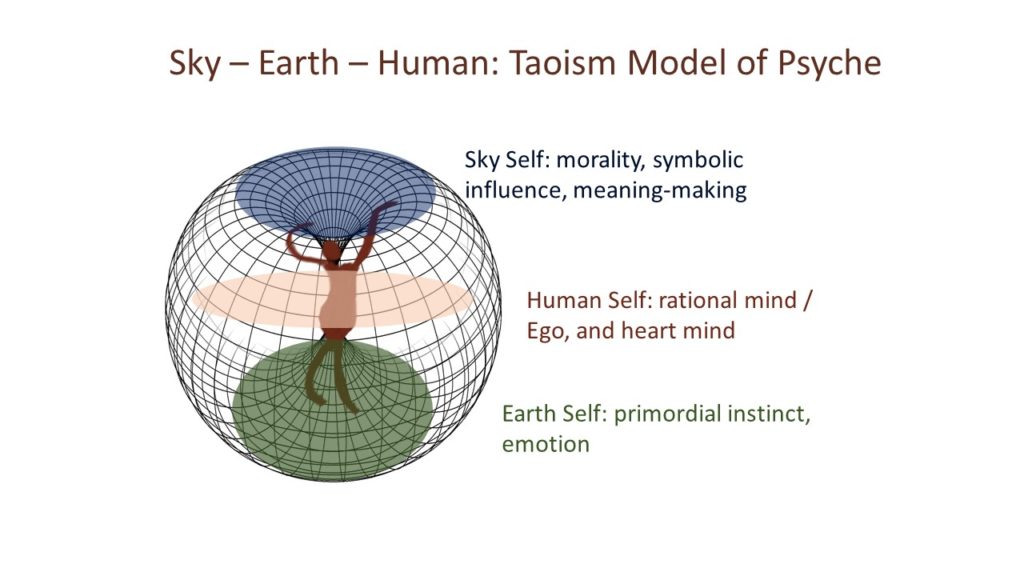
In 2020, I began teaching the Resonance Code in its native language to Chinese people. I received tremendous responses. People shared with me their experiences of homecoming, returning to the spirit of our own indigenous culture. Some of these Chinese students have studied western developmental models. They told me that before they studied the Resonance Code, they felt as though their minds filled with western ideas was like having a head being installed on a wrong body. Now, they have language to express what they feel in their bodies. With that, they can actually look at the western concepts through more objective eyes and integrate them better!
Guided by the Resonance Code, we can practice respect by honoring and surrendering to the primordial life force of the Earth Mother. We can consciously welcome her return to our being. In our surrendering, the Earth Mother teaches us how to elevate our instincts to conscious awareness, not out of a sense of insecurity and lack, but out of an inherent connection with all living beings.

I want to emphasize that Earth Mother is an aspect of psyche equally available to both men and women. With this Earth Mother awareness, we don’t need to condemn patriarchy or make it wrong. This awareness evokes the restorative power of the Earth to heal the wounds of the past allowing us to form bonds of greater intimacy, and giving birth to immense creativity.
The most prominent feature of the maternal instinct is feeling the pulsation of life beyond one’s own body, as a mother feels her fetus and as a fetus feels her mother. It is natural for women to feel their Earth Mother instinct. But, in a patriarchal society biased toward putting men in the most prominent roles, there is little space for women to express this instinct in the workplace and in organizations. Admitting that one can feel the aliveness or energies present in one’s environment guarantees one not to be taken seriously, especially in institutions defined by patriarchal power such as in the academic sciences or in governmental agencies.
Countless women shared experiences like this with me. One woman consultant worked in governmental agencies extensively. Later she had breast cancer. She told me that her body had been soaking in the “sickness of the organizational bodies” for years and eventually manifested as cancer. This ability to “feel” the organizations as living entities is a natural expression of her powerful instincts. However, she can’t talk about this safely to anyone in the places she worked. She has little agency in how to work with this instinct. If we do not learn how to take this aspect of human psyche seriously and inhabit it with dignity, we can’t learn how to work with this ability, when to use it and when not. We are at the mercy of its distorted expression.
Young boys may carry Earth Mother instincts too. But the patriarchs torched this instinct a long, long time ago, leaving only terrible scars passing from fathers to sons. Our education system is built upon caging and boxing in most of our somatic, primordial instincts. In my view, the fundamental constructs of western psychology, unconscious-conscious, subject-object all carry the imprint of these scars and wounds.
I need to point out that indigenous cultures are not totally immune to over-dominating patriarchal influences. What distinguishes indigenous cultures from modern cultures is that the indigenous cultures have not severed their ties to the ultimate mother, Earth herself.
Many of my educated and well-meaning western friends seek mystical and spiritual practices indigenous to East Asia to cultivate a sense of wholeness. In my experience of teachings indigenous to East Asian cultures, the ways they are taught today can carry potent patriarchal influences. Their origins, blended with the dominant culture, can wind up reflecting more of the dominant culture’s values than those of the originating peoples. Without careful discernment, we can continue to perpetuate the oppression of our ancient maternal instincts without conscious awareness.
I call us to summon the courage to face this sad, but sobering reality: most of us cannot imagine a civilization where there is a balance and mutual flow between the mother and father archetypes. We may not be able to see it when it is right in front of us. My gut instinct tells me that the climate, political and public-health chaos sweeping the entire globe now actually contains a potent form of maternal love from the Great Mother, Earth herself. But this earthly love is an ever so slight, delicate hum vibrating through the instrument of my being. If we do not cultivate an ear to hear it and an embodied instrument to play with it, we cannot receive this love nor be nourished by it.
Taoist psychology: The Yin and Yang of Consciousness
The Resonance Code is the daughter of Tao. Taoism does not see consciousness through the dualistic lens of unconscious and conscious. Instead, it sees through the lens of Yin and Yang. Yin, the Universal Mother, is the instinctual, animated and primordial aspect of consciousness. It is indeed in the “dark”, because it is completely in sync with the steady rhythm of Life. It is the dark womb of “no self”, before the ego mind arises. Humans tend to value light over dark. But in the natural world, darkness is just as precious and essential as light.
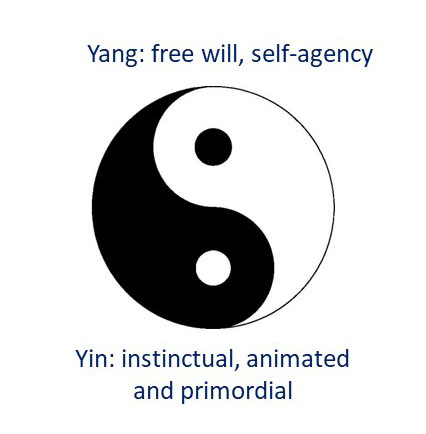
Yang, the Universal Father, is free will, self-agency. In the traditions of indigenous cultures, it can be cultivated through moral, psychosomatic and spiritual development guided by attunement with the natural world, rituals, and traditional stories. In modern times, intellectual development provides a brand-new path and exciting potential for expanding Yang, the conscious agency. However, these potentials can only be realized when Yang and Yin integrate with one another.
Yin and Yang mutually generate each other. Hence, the black dot within the white and white dot within the black of the Taiji symbol. The integration, and mutual generation of Yin and Yang give rise to life.
From this perspective, I see most western-based vertical development models do a thorough job describing the pathway from Yin to Yang, from dark to light, from unconscious to conscious. In Resonance Code, I call this pathway the enlightening pathway.
Resonance Code sees development as a bi-modal oscillation between the Great Yin and Great Yang. The pathway from Yang to Yin, from light to dark, subtle to embodied, is called the enlivening pathway. These two pathways, enlightening and enlivening correspond to two major meridians in our body, the governing and conception vessels, as described by Chinese medicine and Taoist self-cultivation. As the names reflect, the enlightening pathway develops Yin to Yang, the self-agency, allowing us to self-govern. The enlivening pathway develops Yang to Yin, the ability to conceive new life energy and self-regenerate.
The western-based developmental models do not provide adequate support to nurture the enlivening pathway. Moreover, the subtle down-putting, pathologizing and patronizing descriptions associated with the early developmental stage present a block for the enlivening pathway, pinning us to a petrified patriarchal mindset.
Blockage of the enlivening pathway, the Conception Vessel, reflects itself in a parallel but related field: health care. The western medicine system does not respect and support the self-regenerative capacity of human bodies. It treats the body as a passive, inanimate object to be probed, analyzed and manipulated by chemical interventions. Meanwhile, the healthcare system primarily based on such practice is failing and sinking into a paralysis day by day.

In wholeness, Yin can support and surrender to Yang. Likewise, Yang can support and surrender to Yin. Yin, the Mother Archetype in our psyches has been supporting the Sky Father for millennia. She has been silent, unseen and not honored. I invite you to join me to celebrate her, honor her, and invite her back into the garden of our awareness. I also invite you to join me in building a bridge between the eastern and western understanding of adult development by pooling our knowledge of enlightening and enlivening pathways together. May we evolve together as a whole!”
Moana, the Disney Princess
I end this essay with the storyline from a Disney animation, Moana, which paints a graphic metaphor of my message. In this movie, a young boy named Maui is abandoned by his parents. However, he is saved by God and becomes a demi-god. Out of arrogance, he steals the heart of Te Fiti, the great Earth Goddess, a feminine creator. As a result, a terrible ecological disaster spreads fast all over the Pacific islands.
Moana, the daughter of a village chief, is appointed by the Ocean to find Maui, and to take him to Te Fiti so he can apologize and return her heart. This pair, Moana and Maui, endure a series of adventures that lead to tremendous self-knowledge, growth and compassion for each other.
Eventually they reach the island where Te Fiti lives. They are confronted by a terrible lava monster. This monster, fuming with black smoke, is dressed in raging flames, rising from the depths of the Earth and threatening to destroy everything she encounters. She represents the face of the all-consuming power of destruction. Nothing stands in her way!
In the heat of the struggle, Moana, with the self-awareness she has mastered through her own arduous journey, “sees” the true nature of the lava monster. She bows to the lava monster with respect, and gives the heart back to the lava monster. The lava monster then transforms into the life-giving Earth Goddess. Te Fiti’s memory of her true nature was restored.
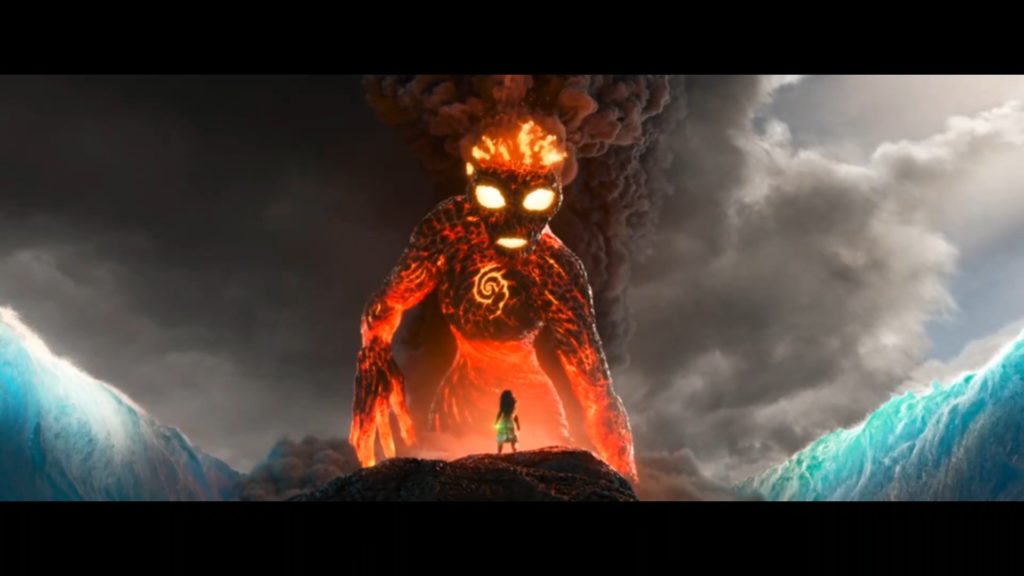
I end this essay by speaking to the Earth Mother in all human beings with the song Moana sings to the lava monster,
They may have stolen the heart from inside of you
But this does not define who you are
This is not who you are
You know who you are.

Spring: thank you for sharing this thoughtful and evocative exploration into the comparison you mention, and even moreso, perhaps the powerful invitation of our time: our living embodiment of mother earth and our need to cultivate the soil from which we ALL grow. Your prose also brings up for me the elevated status of the mind in Western Civilization, to the felt neglect of the heart and body. I am reminded of the moments in life when I’ve been most “touched” by another. Those moments I cherish most are not held within my brain. They live in my heart and in my body.
I look forward to our future dialogues and learning.
Thank you for this! I have long felt, and especially in these most challenging of times, that respect for and return to Indigenous ways is what must happen to create a path for the possibility of healing. Your essay articulates this and explains how we can return to wholeness. May it be so… And I will share this essay/blog with others who are working in the realms of conscious leadership and human development.
Spring,
I am emboldened yet again by your writing and articulation of true balance. I am even starting to experience the true agency that supports those instinctual primordial instincts to speak and have an equal voice. I love this line:
“When supplied with that instinctual sense of belonging, I have more will power, more courage, and more momentum to express my potential than my wildest dreams can imagine.” Thank you for continuing to point and name and explore what we all know but have forgotten. Love, Lisa
Flabbergasted and in awe for the incredible wisdom of the universe, I find myself speechless after reading your open letter. What a gift! Everything has its right time. Today -Sunday- it is the first day of Spring! Only yesterday someone asked me: do you know Spring Cheng?
And now I feel a strong impuls to respond. Even before I have studied your Resonance Code, I feel touched, connected and confirmed in my strivings. Thank you! I sense I found a colleague, a sister, a fellow-traveller on a familiar mission. Would you believe it: I am about to launch a website from which the first opening sentence is: ‘toward wholeness and balance’…. (all be it in Dutch, since I am living in the Netherlands).
Dear Spring, for the last 5 years, on invitation I have been teaching Biography in China, guided by a sentence from R. Steiners Foundation Stone, that is dear to my heart: ‘let from the East be inspired what from the West takes form’; so I guess I do understand wholeheartedly what you mean by ‘bridging eastern and western consciousness’. My own 65 years old life tree is rooted in Europe, right in the middle between both ‘outer ends’ where you live. Daily study and practice of Taoism and I Ching have carried and enabled me to do my job and I do recognize all phenomena you mention. And now I wonder: would it be fruitful to meet and exchange? I would love to, if not for bigger reasons, maybe only to get to know each others story and be a ‘motherly witness on the path…’
Let me anyway thank you for your beautiful essay and wish you all the best:
An abundance of warmth and light on your journey. With love, Josien.
I saw clarity and truth in my own growth experience throughout your article. I’m grateful you are using your voice and influence to shape perspectives. My whole body is grateful.
Spring, thank you for speaking truth into the world through this essay. Your words here and in The Resonance Code are challenging my dearly-held assumptions about what the path of development consists of…and what wholeness on that path might look like when we are not over-glorifying the Middle Plane/rational ego mind. I have so much to learn, which thrills me. Thank you.
Also, I wept at the Moana lyrics – we are big Moana fans in our house, and this essay helps me understand just why that movie touches me so deeply!
Just for fun, I am sharing here the lyrics from a song in Frozen II that seems to hold powerful layers of meaning, too. This essay makes me hear them in a new way. What is it with these Disney songs??
Where the North Wind meets the Sea
There’s a river full of memory….
She will sing to those who hear
And in her song, all magic flows
Can you brave what you most fear?
Can you face what the river knows?
…Come, my darling, homeward bound
When all is lost, all is found
Dear Spring Cheng, I once attended a class with you with Coaches Rising and was deeply touched both by your presence and by your message – by the wisdom you brought – I felt personally enriched by your cultural heritage and I believe it is important and unique what you bring – I remember wishing for more.
I’m writing to you now because I am with a group of people inside the GEN (growth edge network – a network of people interested in adult developmental theory – in my experience so far a very exploratory and openminded/hearted community) who organise the next virtual gathering which will take place in january. One thing we all wish for and are exploring together is how to be more inclusive so that more people from an asian cultural background feel drawn to participate. And I immediately thought of you. The Gathering (probably entitled Following the Moon) is not just the kind of conference where experts present or share their knowledge, more oriented towards shared inquiry and dialogue. I think it would be wonderful if you were willing to bring yourself into that – and many people would be enriched by what you have to bring.
So… for one thing, I would be absolutely delighted if you were willing to have a dialogue with me about that possibility. Perhaps you could share your response in an email to the address below? I would be honoured, warmest greetings from Greece, Romeck